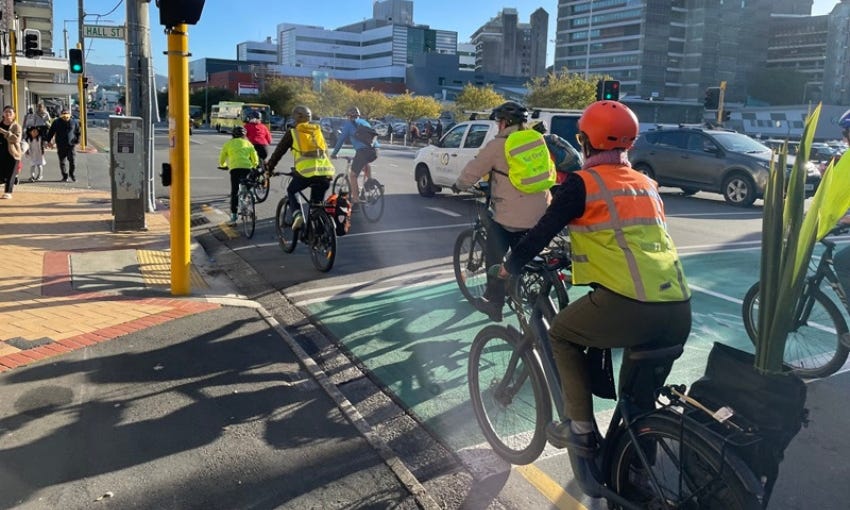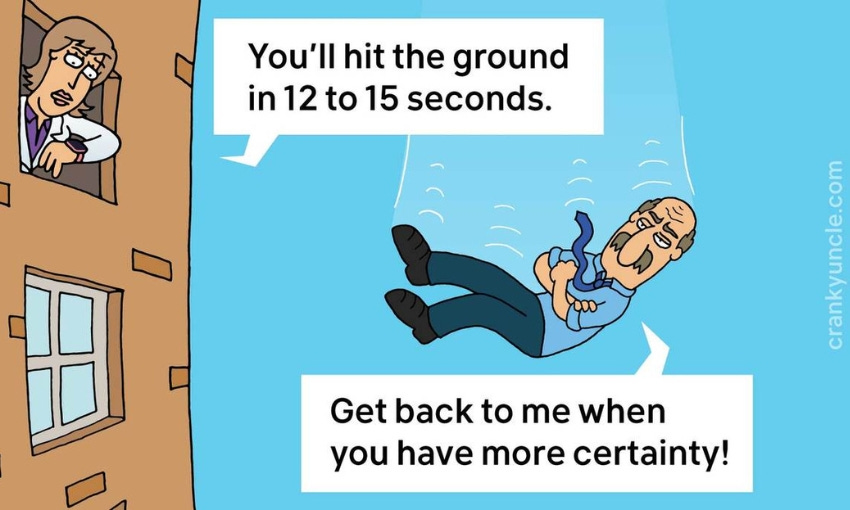Cycle lanes are good for business, actually
‘Cycling Works’ aims to show business support for citywide cycle infrastructure.
Kia ora, welcome to Future Proof. Thanks for joining me! This week: stubborn optimism and a conspiracy theory about eating bugs. But first: are cycle lanes really bad for business?
Image credit: Wellington City Council (CC BY 4.0).
Last week, supermarket giant Foodstuffs lost its attempt to block the construction of a cycle lane outside Thorndon New World in Wellington. The Spinoff’s Wellington editor Joel McManus has the details of a plucky grocer taking on Big Bicycle. The court case is the latest in an ongoing saga surrounding the capital’s Paneke Pōneke plans to expand its cycle network from 23km to 166km.
Far from catering to “ghost cyclists” – as one disgruntled business owner suggested – thousands of trips are registered every month on the new cycle infrastructure. It’s a number that is growing, with a 140% increase in bike trips since 2022, Stuff reports.
Having safer cycle lanes means not having to practise “defensive cycling”, says Alex Dyer, co-chair of Cycle Wellington. “It lets me return to what is so enjoyable about riding a bike in the first place, which is just as close to flying as humans get,” he says.
Despite keeping people safe and providing more low-carbon transport options, cycle lanes tend to frazzle some who seem particularly wedded to the idea of reserving swathes of precious public space for storing private cars.
Which is understandable if you’re a street-level operation stressed out about competing with malls or retail parks with hundreds of car parks. But these concerns are unfounded. Cyclists and walkers have money to spend too.
“Evidence shows that lots of street-level businesses overseas actually thrive when they are in an environment that is friendly for people, not cars,” says Dyer. He’s right. The idea that replacing car parks with cycle lanes is bad for business is a frustratingly persistent myth, despite study after study finding either no overall impact, or a positive impact.
In Wellington, analysis of preliminary retail spend data for businesses adjacent to new cycle lanes finds that “data does not show a pattern of retail activity being negatively affected by changes to street layout”. Some businesses are even using the cycle lanes to innovate, like the Newtown Greengrocer which has introduced e-bike deliveries.
Despite naysayers often being lumped together under the amorphous label of “business”, plenty of businesses are supportive of cycling infrastructure. In Auckland, the Karangahape Road Business Association and Ponsonby Business Association supported projects that would create a cycle network.
Dyer and the folks at Cycle Wellington want to illustrate business support through their Cycling Works initiative. “It allows businesses to put their company’s brand behind calling for better cycling, so their people can get to work and back safely,” Dyer explains.
The idea originated in London, a city in the midst of a cycling renaissance, where advocates have collected 200 endorsements, including Deloitte, Microsoft and Coca-Cola. In Wellington, 19 businesses have signed up so far. Bike Auckland have just launched their version of Cycling Works too.
“Ultimately we’re after the network effect,” says Dyer. “Once you’ve got a way for people to get to a range of things they need – school, work, shopping – and it’s safe, you start seeing the numbers grow.”
Join The Spinoff Members
“With a publication like the Spinoff, you never know quite what excellent journalism you will find. Complement this with the literary wizardry covering all manner of cultural topics, and you are contributing to a very fine publication indeed.” – Julie, Spinoff Member since 2019.
If, like Julie, you enjoy our work and want to support us, please consider becoming a member today.
‘Stubborn optimism’ is the only option
Recent climate news hasn’t been fun, with 2023’s northern hemisphere summer the warmest in 2,000 years, and the current rate of CO2 increase in the atmosphere 10 times faster than any point in the last 50,000 years. Big yikes. It’s no wonder climate scientists are feeling deep despair. The Guardian surveyed 380 top climate scientists about what they think is in store for our future, and how they feel about it. It’s confronting – but necessary – reading.
In response, the former UN climate change chief Christiana Figueres says we cannot brake at the point of despair, but must shift gears into “stubborn optimism”: “A sense of despair is understandable, but it robs us of our agency, makes us vulnerable to mis- and disinformation, and prevents the radical collaboration we need… grief that stops at despair is an ending that I and many others, most notably those on the frontlines, are not prepared to accept,” she writes.
How are we gonna electrify everything if we struggle to power a chilly morning?
Ahead of a cold snap last week, Transpower warned of possible blackouts and asked users to reduce power consumption. The Kākā’s Bernard Hickey explains why this happened – attributing some of the blame to gentailers prioritising profit over building already-consented wind farms – and what can be done to fix it.
Perhaps part of the solution could come from the farming sector, according to a new report from Rewiring Aotearoa. The report suggests that installing mid-scale solar systems on the country’s 50,000 farms could provide two-thirds of our current electricity needs, while battery banks could help soften demand peaks. “As the cost of large-scale infrastructure continues to increase and the price of panels and batteries continues to drop, the case for more focus on customer generation to meet growing electricity demand has never been stronger and farms are perfectly placed to deliver it,” says Mike Casey, CEO of Rewiring Aotearoa.
In other good news, once the gentailers finally get around to building their already consented wind farms, those turbines will quickly offset their lifecycle emissions. Researchers analysed real construction data from a Hawke’s Bay wind farm, from manufacturing parts to transport to decommissioning. It takes about a year and a half of spinning for a wind turbine to offset the emissions generated across its 30-year lifespan.
Behind the Story is a new podcast from The Spinoff that goes beyond the bylines. Join The Spinoff editor Madeleine Chapman every Saturday as she sits down with a staff writer or contributor to gain more insight about a big story on The Spinoff from the week. Listen now.
More stories
Monday’s Bulletin has an excellent update on the Fast-track Approvals Bill, and why the UK parliament is monitoring the controversial proposed legislation.
When Papatūānuku (Earth) in Whakatāne was contaminated by toxic discharge, mana whenua led a meaningful solution.
Funding for the Auckland to Hamilton commuter train Te Huia is set to be scrapped. Community activist Georgie Dansey explains why it must be saved.
In Iceland, the world’s biggest carbon removal plant has just come online.
Developing a daily practice of sustainability can help ease your eco-anxiety.
What’s the most powerful climate action you can take? Vote for politicians who will actually do something about it, say climate scientists.
K-pop fans are increasingly channelling their energy into climate and environmental activism.
Red-billed gulls seem like they’re everywhere, but are we about to lose them? Kate Evans investigates for New Zealand Geographic. (Related from the Future Proof archives: In defence of seagulls.)
A severe drought in Mexico – made more likely by climate change – could mean another sriracha shortage is coming.
Image credit: John Cook/crankyuncle.com.
To finish this edition, do you have a cranky uncle with a penchant for climate denial and crackpot theories? Give the Cranky Uncle game a go, to see how psychological inoculation can help fight climate misinformation. On a related note, on The Spinoff this week Byron C Clark brings us the latest in insane climate conspiracies: the world’s elite are going to force us all to eat bugs to stop global warming, apparently.
Those buguettes just ain’t gonna fly,
Ellen
Future Proof is looking for a sponsor!
Connect your brand with an insightful exploration of environmental news, reaching influential readers committed to sustainability and staying informed about the state of our natural world. Contact commercial@thespinoff.co.nz to learn more.
Got some feedback about Future Proof or topics you’d like covered? Get in touch with me at futureproof@thespinoff.co.nz














I lived near New York City in the early 90s and wouldn’t have believed that you could retrofit the incredible cycling infrastructure they have now. Travelling around the city by bike now is an absolute delight. And the drivers were far nicer than they are to me in New Zealand, unfortunately.
I know how disruptive building light rail and cycle lanes were in Sydney, but the utilization of both I saw when there the other week was phenomenal. The CBD as a pedestrian was a really pleasant experience.